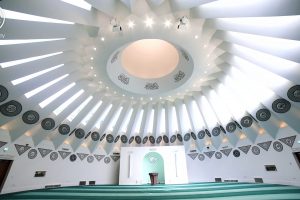
In the Mubarak Mosque in Islamabad, Tilford, His Holiness Hazrat Mirza Masroor Ahmad (aba) envisioned having the attributes of Allah on its walls so people could reflect deeper on God’s existence. His Holinessaba guided minutely on all aspects of design and implementation.
This series delves deeper into each of God’s attributes to gain a better understanding of His Being.
The calligraphy was designed by Razwan Baig, while The Review of Religions were given the opportunity to manage the project and produce each piece. Research for this series was translated into English by Shahzad Ahmed, Zafir Mahmood Malik and Nooruddeen Jahangeer Khan.
110.The Beautiful (Al-Jamīl)

The attribute of الْجَمِیْلُ (Al-Jamīl) is not found in the Holy Qur’an, but has been mentioned in a tradition of the Holy Prophet (sa). As such, Hazrat Abdullah bin Mas’ud (ra) narrates a tradition in which the Holy Prophet (sa) said: ‘He who has pride in his heart equivalent to the weight of a mustard seed shall not enter Paradise.’ A man asked: ‘A person naturally likes to wear good clothing and elegant shoes.’ The Holy Prophet (sa) replied: ‘Verily Allah is beautiful and loves beauty. Pride is when one rejects the truth owing to one’s arrogance and looking upon people with contempt.[1]
It is derived from the Arabic root of جَمَلَ (Ja-ma-la) and means he was or became beautiful and good in action, behaviour or in moral character.[2]
God, the Possessor of All Beauties
Explaining the fact that one’s salvation lies in forging a connection with God Almighty, the Promised Messiah (as) states:
‘Our God possesses countless wonders, but they are visible only to those who become His out of sincerity and loyalty. He does not disclose His wonders to those who do not believe in His power and who are not sincere and loyal to Him. How unfortunate is the man, who even now, is unaware that there is a God Who has power over all things. Our paradise lies in our God. Our highest delight is in our God for we have seen Him and found every beauty in Him. This wealth is worth procuring though one might have to lay down one’s life to procure it. This ruby is worth purchasing though one may have to lose oneself to acquire it. O ye, who are deprived! Hasten to this fountain as it will satiate you. It is this fountain of life that will save you. What am I to do? How shall I impress the hearts with this good news? What sort of a drum am I to beat in the streets in order to make the announcement that this is your God, so that people might hear? What remedy shall I apply to the ears of the people so that they should listen?’[3]
ENDNOTES
[1] Sahih Muslim, Kitab al-Iman, Hadith no. 171.
[2] Al-Munjid.
[3] Hazrat Mirza Ghulam Ahmad (as), Noah’s Ark (Tilford, UK: Islam International Publications Ltd., 2016), 36-37.
111. The Severe (Al-Shadīd)

غَافِرِ ٱلذَّنۢبِ وَقَابِلِ ٱلتَّوۡبِ شَدِيدِ ٱلۡعِقَابِ ذِي ٱلطَّوۡلِۖ لَآ إِلَٰهَ إِلَّا هُوَۖ إِلَيۡهِ ٱلۡمَصِيرُ
‘Forgiver of sin, Acceptor of repentance, Severe in punishment, Lord of bounty. There is no God but He. Towards Him is the final return.’[1]
The attribute of شَدِیْدُ الْعِقَابِ (Shadīd al-‘Iqāb) is derived from the root word عَقَبَ (‘A-qa-ba) which means ‘He struck his heel, at his heels, or close after him; he succeeded him.’[2] According to the Arabic lexicon, ‘Aqrab al-Mawarid, الْعِقَابُ (al-‘Iqāb) refers to the punishment one receives after committing a sin.
With regards to the verse cited above, Hazrat Abu Hurairah (ra) has stated that the Holy Prophet (sa) said: ‘Whosoever recites Ayat al-Kursi and the verses of Surah Mu’min starting from حمٓ up to the verse غَافِرِ ٱلذَّنۢبِ وَقَابِلِ ٱلتَّوۡبِ شَدِيدِ ٱلۡعِقَابِ ذِي ٱلطَّوۡلِۖ لَآ إِلَٰهَ إِلَّا هُوَۖ إِلَيۡهِ ٱلۡمَصِيرُ he will not have to face any difficulties until the evening, and whosoever recites it in the evening will not have to face any difficulties until the morning.’[3]
Those Who Utter Falsehood in the Name of God Are Punished
With regards to those who forge lies against God, the Promised Messiah (as) state:
‘However, I call to witness God and His angels that he who insolently forges a lie against God and falsely claims to be the recipient of divine revelation and wrongly says that he has been blessed with divine discourse, will be destroyed. For such a person speaks untruth about his Creator and acts deceptively; he demonstrates manifest temerity and impudence. So be cautious in this respect. Cursed are those who fabricate false dreams and wrongly claim to be recipients of divine discourse, for by doing so, in their hearts they think that God does not exist. However, the punishment of God will forcefully seize them and their days of misfortune will see no end. So strive in the way of truth, piety, righteousness and progress in the personal love of God and view this as the chief objective of your life. Then, in accordance with His will, God shall bless whomsoever He pleases from among you with His discourse.’[4]
ENDNOTES
[1] The Holy Qur’an, 40:4.
[2] Malik Ghulam Farid, Dictionary of the Holy Qur’an (Tilford, UK: Islam International Publications Ltd., 2006), 582.
[3] Sunan al-Darimi, Kitab Fada’il al-Qur’an, Hadith No. 3429.
[4] Hazrat Mirza Ghulam Ahmad (as), Noah’s Ark (Tilford, UK: Islam International Publications Ltd., 2016), 46-47.
112. The Eternal (Al-Abad)

According to the Arabic lexicons, ‘Aqrab al-Mawarid, أَبَدٌ (Abad) refers to that being which is everlasting and eternal. أَبَدٌ also refers to time in in an absolute sense; a long time; unlimited time; an extended space of time that is indivisible. Although the wordأَبَدٌ appears in various verses of the Holy Qur’an, it is not mentioned as an attribute of God Almighty. In fact, it is mentioned as an attribute by the Holy Prophet (sa) in a hadith.
Hazrat Abu Hurairiah (ra) relates that the Holy Prophet (sa) stated, ‘Allah the Almighty has 99 names. He Himself is Witr [unique/odd number] and also loves that which is Witr. Whoever remembers these names will enter paradise. the names are as follows: Allah, the One, the Independent and Besought of all, the First, the Last, the Manifest, the Hidden, the Creator…the Eternal…and there is none like unto Him.’[1]
God – The Eternal and Everlasting
Explaining the Eternal and Everlasting nature of God Almighty’s Being, the Promised Messiah (as) states,
‘In the Holy Quran, God describes His attributes as follows:
قُلۡ هُوَ ٱللهُ أَحَدٌ * ٱللهُ ٱلصَّمَدُ * لَمۡ يَلِدۡ وَلَمۡ يُولَدۡ * وَلَمۡ يَكُن لَّهُۥ كُفُوًا أَحَدُۢ
i.e., your God is One in His Being and in His attributes. No one is eternal and everlasting like Him, nor does anything possess attributes similar to His. Man depends upon a teacher for his knowledge, yet his knowledge remains incomplete, but God needs no teacher, for His knowledge knows no bounds. Man depends upon the air for his hearing which is limited, but God’s hearing is inherent and unlimited. Man depends upon the light of the sun or other sources of light to see, and his sight is restricted, but God sees by His own light and His sight encompasses everything. In order to create, man is dependent upon matter and requires time, and his power of creation is confined, but God’s power of creation is not dependent upon matter or time, nor is it in any way limited. This is because all His attributes are unique like Himself, and if even one of them was flawed, they would all be considered flawed. His Unity – Tauhid – cannot be established unless He is seen to be peerless both in His Person and in His attributes.’[2]
ENDNOTES
[1] Sunan Ibn Majah, Abwab al-Du‘a, Bab Asma’ Allah Azza wa Jall, Hadith no. 3861.
[2] Hazrat Mirza Ghulam Ahmad (as), Lecture Lahore (UK: Islam International Publications Ltd., 2008), 11-12.
113. The Complete and Perfect (Al-Tāmm)

The attribute التَّامُ (Al-Tāmm) is derived from the root, تَمَّ (Tamma). Tamma al-shai’ means the thing was or became complete, entire, whole or full on without or free from deficiency. Sometimes it also means, the thing was or became perfect.[1] According to the lexicon, ‘Aqrab al-Mawarid, al-Tāmm is the opposite of النَّاقِص (al-Nāqiṣ) which means imperfect and defective. Similarly, a month which consists of thirty days is also known as تَامٌّ, i.e. complete.
The word al-Tāmm does not appear in the Holy Qur’an as an attribute of God Almighty. In fact, it is mentioned as an attribute by the Holy Prophet (sa) in a hadith.
Hazrat Abu Hurairah (ra) relates that the Holy Prophet (sa) stated, ‘Allah the Almighty has 99 names. He Himself is Witr [unique/odd number] and also loves that which is Witr. Whoever remembers these names will enter paradise. the names are as follows: Allah, the One, the Independent and Besought of all, the First, the Last, the Manifest, the Hidden, the Creator…the Complete and Perfect…and there is none like unto Him.’[2]
Allah is Free From All Defects
In relation to the perfect Being of God Almighty, the Promised Messiah (as) states:
‘All His attributes are eternal and everlasting. None of His attributes has fallen into disuse or will fall into disuse. He is the One without associate Who has no son and no consort. He is the Peerless One Who has no equal and like Whom no individual is absolutely qualified with any quality, and Whose attributes are not shared by anyone. None of His powers lacks anything. He is near and yet far and He is far and yet near. He can manifest Himself in any shape to those who have experience of visions but He has no body and no shape. He is above all but it cannot be said that there is anyone below Him. He is on His throne, but it cannot be said that He is not on the earth. He combines in Himself all perfect qualities and is a manifestation of all true praiseworthiness. He is the fountainhead of all excellences and combines in Himself all powers. All grace originates with Him and everything returns to Him. He is the Master of all kingdoms and possesses every perfect quality. He is free from every defect and weakness.’[3]
ENDNOTES
[1] Malik Ghulam Farid, Dictionary of the Holy Qur’an (UK: Islam International Publications Ltd., 2004), 106.
[2] Sunan Ibn Majah, Abwab al-Du‘a, Bab Asma’ Allah Azza Wa Jall, Hadith no. 3861.
[3] Hazrat Mirza Ghulam Ahmad (as), The Essence of Islam, Vol. 1 (UK: Islam International Publications Ltd., 2007), 47-48.




Add Comment